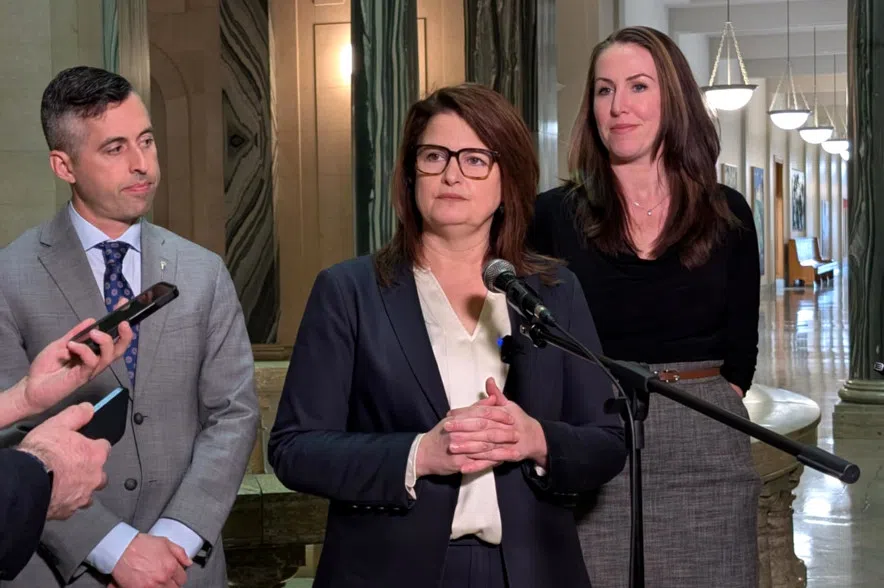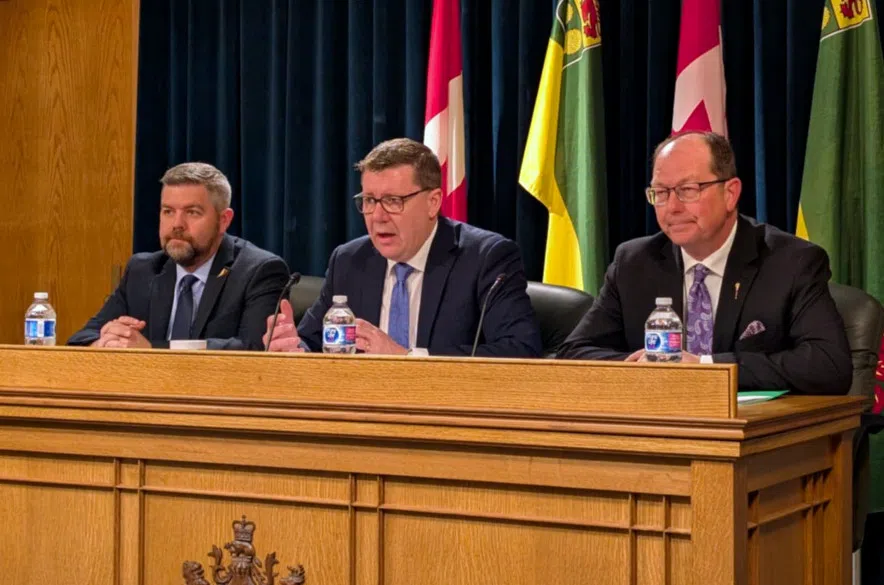Saying the big impact will be the money people in Saskatchewan save with this move, Premier Scott Moe gave a bit more detail about the zero-ing out of the industrial carbon tax. However, several answers were missing.
As of April 1, the provincial government will reduce the rate on its industrial carbon tax to zero – the province operates its own tax on large emitters called output-based performance standards, implemented to avoid the federal backstop.
“We have always stood, I think from day one, against this tax. We don’t think it is in any way an environmental tax, but ultimately is preventing, in many ways, investment and enhancing the inflationary costs that we are experiencing as Canadians,” said Moe.
The premier insisted he was following the lead of the federal Liberal and Conservative party leaders with this move – Pierre Polievre has promised the Conservative Party will scrap the entire carbon tax, while the Liberal’s Mark Carney zeroed out the consumer portion of the tax but has said he will keep the industrial tax.
When asked if he’s jumping the gun on this move, instead of waiting to see which party wins the federal election, Moe said it’s important for people to know now what the federal leaders will do about the industrial tax. Moe encouraged the federal leaders to give regulatory authority on the carbon tax back to the provinces.
“Provinces know best when it comes to how to regulate largely natural resources, but also how to ensure that in their region of Canada, we’re making the most affordable environment for the families that we represent,” said Moe.
The Government of Saskatchewan took the federal government to court over the carbon tax, losing at the Supreme Court of Canada.
“We’ve challenged it before,” said Moe when asked about the federal government coming in to impose its backstop. “And we’re always looking for opportunities to change it again as we don’t think it’s a proper policy, at least not for Saskatchewan.”
Moe said the move would help people with the affordability of their power bills and other things, calling the industrial tax a “quiet tax” that ends up on everything. But also that he thought it would help investment in industry in the province, particularly in the current tariff-threatened environment.
Moe and his ministers couldn’t say Thursday morning how this move would affect industry and how the program would be exited.
“Some of those details would come out days and weeks into the future when we understand what that exit would actually look like,” said Moe.
He also couldn’t say how it would affect the provincial budget, which at that point hadn’t been passed yet.
The budget was presented with a $12 million surplus, but the revenue within the budget also listed $431.5 million that the government expected to bring in from the industrial tax in 2025-25.
After several questions being lobbed at the premier about what would happen to the budget’s bottom line, Moe said the change would be “immaterial” to the budget.
“We have a balanced budget, or a $12 million surplus, that’s introduced into the legislature, and we have every intent on delivering that throughout the year,” said Moe.
Part of that carbon tax money flowed through into a fund to pay for small modular nuclear reactor development in the province. Moe didn’t say what might happen to that money or that fund. He said a decision on SMRs was years out yet, not expected before 2029, and that the province has committed to extending the life of the current power generation SaskPower has.
“We have very much, I wouldn’t say shifted our focus, but increased the focus into ensuring that, first and foremost, we have reliable, affordable power for Saskatchewan residents and the industries that are here today and the industries that are going to operate tomorrow,” said Moe.
The premier said his government is going to reduce emissions over time, but said it’ll be done in a “sensible” way that won’t quadruple energy costs.

Sask. NDP Leader Carla Beck, flanked by NDP critic for the Environment Jared Clarke (L) and NDP SaskPower critic Aleana Young (R). Mar. 27, 2025 (Lisa Schick/980 CJME)
Sask. NDP Leader Carla Beck called this move, the government blowing a $400 million hole in its budget.
“This government continues to pretend … that they have delivered, somehow, a balanced budget or a budget with a surplus. No one believes that,” said Beck.
She said it’s clear the provincial government doesn’t have a plan on what it’s going to do next – Beck said the people of the province deserve better than that, particularly at a time when people are already worried.
“I think that not only defies the reality that we face, I think it’s, frankly, insulting to the intelligence of people in this province,” said Beck.
Beck voted against the budget Thursday morning, though it still passed with government support.
SaskPower
Minister responsible for SaskPower, Jeremy Harrison, said Thursday the change will save families hundreds every year on their power bills and thousands, perhaps even millions, of dollars a year for companies and industrial customers.
Harrison said well over 10 per cent of people’s bills, currently, are the industrial carbon tax – he said that would eventually get up to 25 per cent.
The minister implied the change wouldn’t be a detriment to the Crown.
“At SaskPower, we can manage without the industrial carbon tax in place, we can manage what our future’s going to look like at SaskPower without any of these resources,” said Harrison.
Aleana Young is the NDP’s SaskPower critic. She said money normally has flowed from the industrial tax in Saskatchewan, back into SaskPower – expected to be more than $100 million for the second half of the current fiscal year.
“That’s money that ostensibly could be used to keep rates low, to invest in innovation, to build out electrical generating capacity,” explained Young.
With no plan to deal with the removal of that revenue in the provincial budget, Young said she doesn’t know yet how it’s going to be made up.
“Are the people of Saskatchewan going to be experiencing double-digit increases in their power bills? I think it’s an incredibly important question when people are struggling to afford the basics before this,” said Young.







